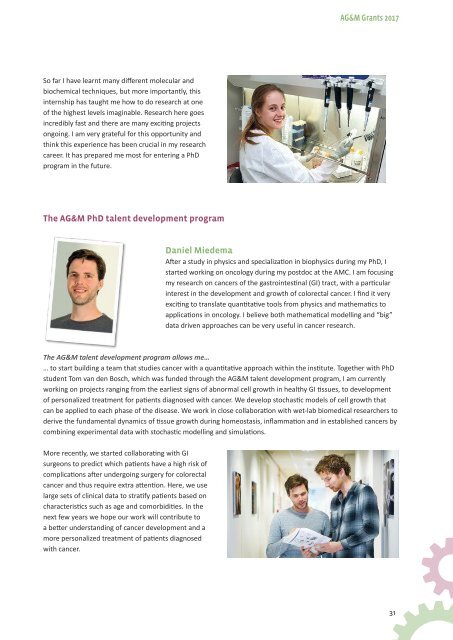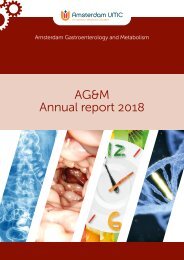AG&M annual report 2017
You also want an ePaper? Increase the reach of your titles
YUMPU automatically turns print PDFs into web optimized ePapers that Google loves.
AG&M Grants <strong>2017</strong><br />
So far I have learnt many different molecular and<br />
biochemical techniques, but more importantly, this<br />
internship has taught me how to do research at one<br />
of the highest levels imaginable. Research here goes<br />
incredibly fast and there are many exciting projects<br />
ongoing. I am very grateful for this opportunity and<br />
think this experience has been crucial in my research<br />
career. It has prepared me most for entering a PhD<br />
program in the future.<br />
The AG&M PhD talent development program<br />
Daniel Miedema<br />
After a study in physics and specialization in biophysics during my PhD, I<br />
started working on oncology during my postdoc at the AMC. I am focusing<br />
my research on cancers of the gastrointestinal (GI) tract, with a particular<br />
interest in the development and growth of colorectal cancer. I find it very<br />
exciting to translate quantitative tools from physics and mathematics to<br />
applications in oncology. I believe both mathematical modelling and “big”<br />
data driven approaches can be very useful in cancer research.<br />
The AG&M talent development program allows me…<br />
… to start building a team that studies cancer with a quantitative approach within the institute. Together with PhD<br />
student Tom van den Bosch, which was funded through the AG&M talent development program, I am currently<br />
working on projects ranging from the earliest signs of abnormal cell growth in healthy GI tissues, to development<br />
of personalized treatment for patients diagnosed with cancer. We develop stochastic models of cell growth that<br />
can be applied to each phase of the disease. We work in close collaboration with wet-lab biomedical researchers to<br />
derive the fundamental dynamics of tissue growth during homeostasis, inflammation and in established cancers by<br />
combining experimental data with stochastic modelling and simulations.<br />
More recently, we started collaborating with GI<br />
surgeons to predict which patients have a high risk of<br />
complications after undergoing surgery for colorectal<br />
cancer and thus require extra attention. Here, we use<br />
large sets of clinical data to stratify patients based on<br />
characteristics such as age and comorbidities. In the<br />
next few years we hope our work will contribute to<br />
a better understanding of cancer development and a<br />
more personalized treatment of patients diagnosed<br />
with cancer.<br />
31



